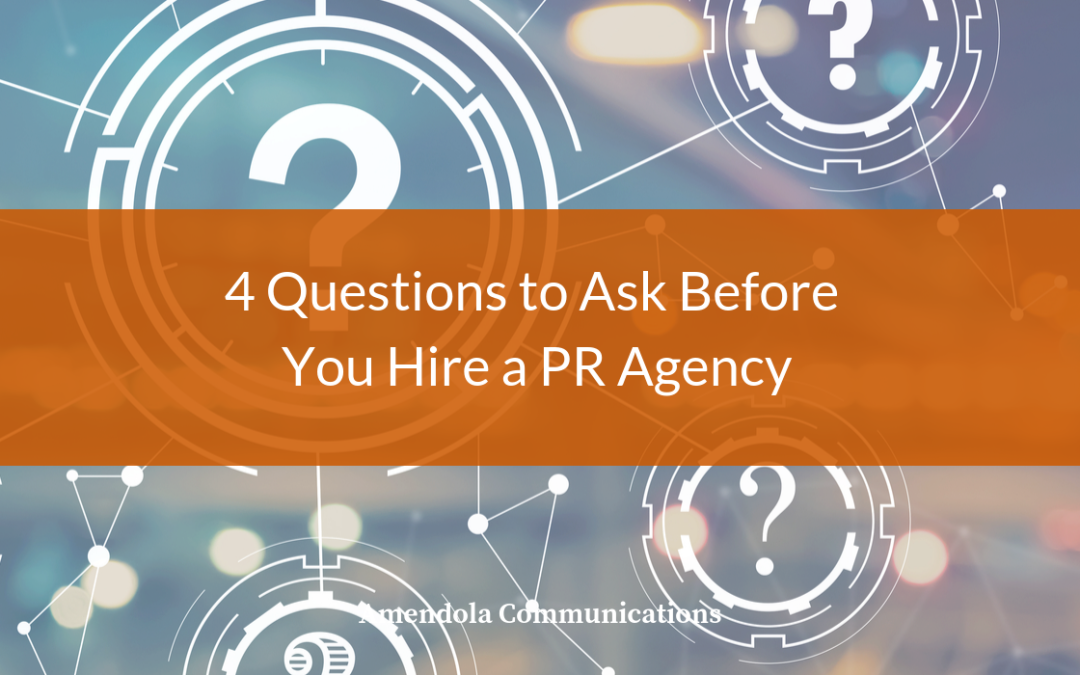
by Jodi Amendola | Oct 16, 2019 | Blog
There are many great reasons companies hire a PR agency.
Start-ups often do it to create a “larger than life” image in the marketplace. Having your executives interviewed by top industry trade media, or having your thought leadership published in top publications, helps build brand awareness and elevates the perception of the company’s position in the industry – an important factor when selling against larger, more established competitors. There’s nothing like having an industry analyst tell a small client they thought the client was much larger based on all the publicity they’ve received.
More established organizations may hire a PR agency to help change a negative perception into a positive one. They may do it to help generate sales leads or provide “air cover” for salespeople when they meet with a prospect – especially when the product has a long sales cycle. They may do it to position themselves for an acquisition, because a great PR campaign can help bring them to the attention of larger organizations looking for good companies to purchase.
Yes, there are lots of good reasons to hire a PR agency. But what’s important to understand is that there’s more to it than simply signing a contract and telling the PR agency to go do their thing.
It’s also going to take effort and commitment on the part of the client and its executives.
That’s why I recently wrote a blog post for the Forbes Agency Council titled, “Four Questions to Ask Before You Hire a PR Agency.” It looks at both the strategic and tactical areas organizations should consider before they contract with a PR agency if they want the relationship to be a success. Here’s a quick excerpt from the first question:
“Every business has the same goal: growth. The challenge, of course, is identifying how to get there. That’s why, before engaging with a PR firm, it’s helpful to develop specific goals that you’re looking to accomplish. Maybe it’s acquiring more clients in a new market vertical, establishing your CEO as a thought leader, or polishing up your company’s messaging. Regardless, a PR firm can’t help you reach your objectives if you haven’t first defined them. “
Other areas covered include the corporate culture, the need for a dedicated account liaison and the fact that unlike advertising or self-publishing, where you have total control over when, where and how your story appears, you have to be willing to accept that everything won’t always be to your liking in PR.
If you’re thinking about hiring a PR agency give this article a read. It can help ensure you’re really ready for a PR program – and that you make a good choice.
Or you can just contact me here at Amendola Communications. We’ll help walk you through the process and ensure your program achieves its goals.

by Matt Schlossberg | Apr 19, 2017 | Blog
On the night of November 2, 2016, the Chicago Cubs won the World Series, ending the longest drought in the history of American sports
OK, before I continue a caveat. This isn’t going to be another metaphorical sports-as-insert-unrelated-industry-here blog post. I’m not going to compare media relations to a clean-up hitter nor end this piece advising your team to “hit is out of the park.”
But there is a practical lesson the Cubbies historic run can offer to organizations that contract with a healthcare PR agency.
When he was hired to run baseball operations for the Cubs in 2011, Theo Epstein held a remarkable press conference. He explained that in order to build a winning club, the entire structure needed to be torn down and rebuilt from the ground up. The overhaul would affect every aspect of the organization, even the ball park, and that several years would pass before the front office’s effort bore fruit.
It didn’t take much to read between the lines the Cubs were going to stink. And not in the usual way fans had become accustomed to. In other words, history-making bad.
What was remarkable and perhaps overlooked about that press conference was Epstein’s transparency. It’s an unwritten rule in sports to never admit to a rebuild, to confess that the product you are placing on the field may be intentionally awful for the foreseeable future.
If you were a Cubs fan between 2011 and 2016 and you referred to “The Plan,” everyone knew what you were talking about.
Reflecting on those sour years, Epstein said, “You realize it’s just easier when you’re transparent. You realize it works with everyone. It works managing up, it works with the media, it works with agents, it works with your fans.
It’s kind of the best way to do things if you can pull it off. Something as simple as transparency is really scalable, because it quickly impacts the culture.”
Transparency is a critical component of a successful PR program. Great PR teams are proactive. Not only do they get ahead of stories, they also help create the narrative. But that only works if a transparent culture is fostered between the agency’s team and the organization it represents.
PR teams that understand the good, the bad and the ugly of the organizations they represent allow them the space to best position the company and its narrative in the public eye. Quietly working on a months-long initiative only to bring it to your PR rep’s attention the day before launch and expect the moon in terms of coverage is unrealistic. Obscuring a poor outcome or promising customers that never show up to interviews puts your rep on the defensive and makes your program reactive, always playing catch up.
Think of your PR team as the guardians of your reputation. They can only protect and position what they know. In short, anything and everything you tell your PR teams helps them help you. On the flip side, a good PR team is going to be explicit about being upfront, diligent and discreet in their communications.
So what are the ingredients for a culture of transparency?
- Be open. It’s important to focus on missed opportunities as much as victories, so we can learn from our experiences and apply it to the next campaign.
- Seek and deliver feedback. PR is as much an art as science. Some initiatives work, others don’t. If your agency’s style of operation doesn’t mesh with your own, speak about it openly and frankly. If you have a good agency, they’ll adapt.
- Make sure good news isn’t the only news. Every organization hits a rough patch a delayed initiative, an unhappy customer, internal shake-ups. Keeping your PR team in the loop helps them offer constructive advice and a strategy for dealing with these issues should they become public.
A transparent culture impact everybody it build trusts, strengthens relationships, and enables your PR team and organization to tap the flexibility and creativity required to be a positive, proactive force in the marketplace.

